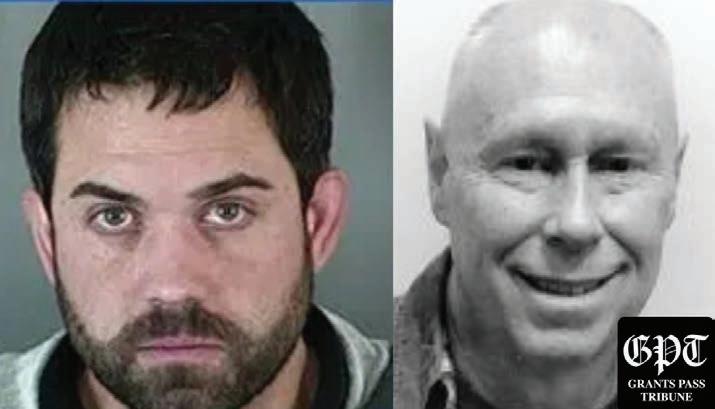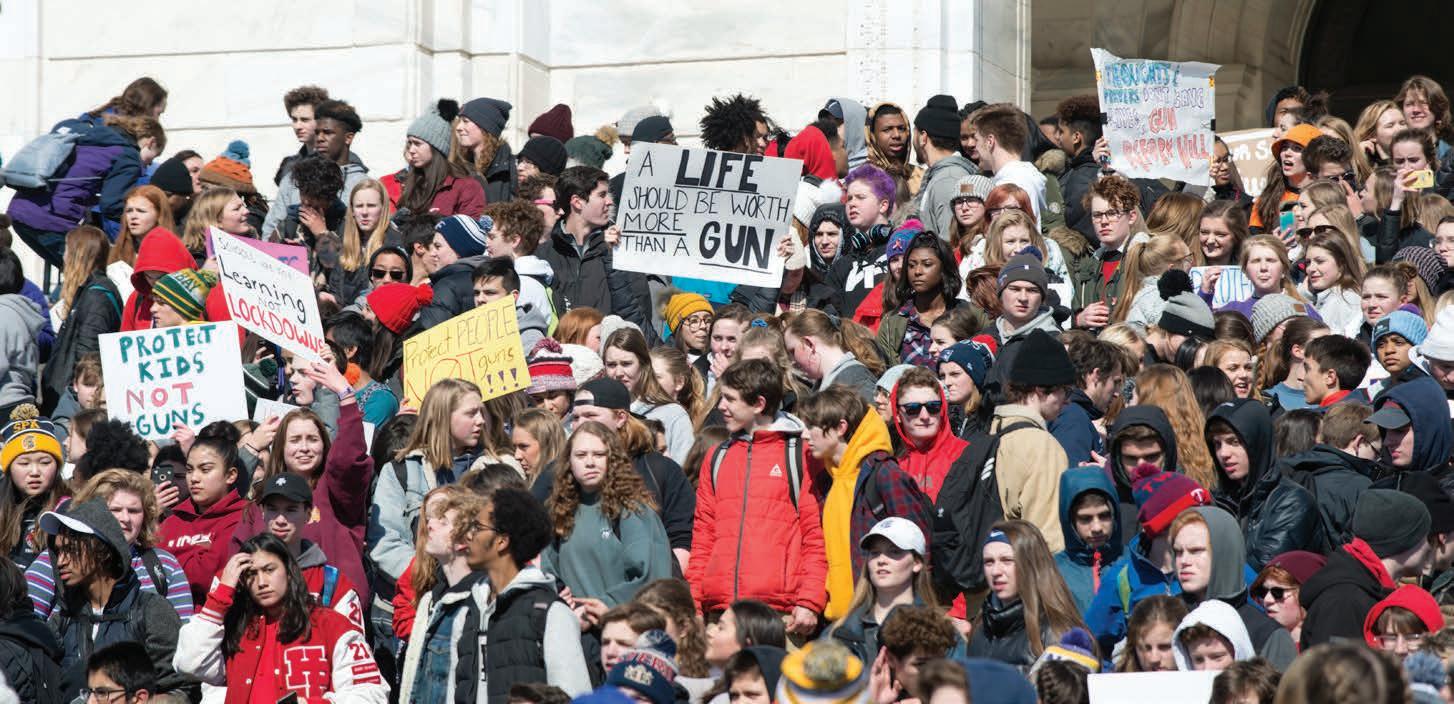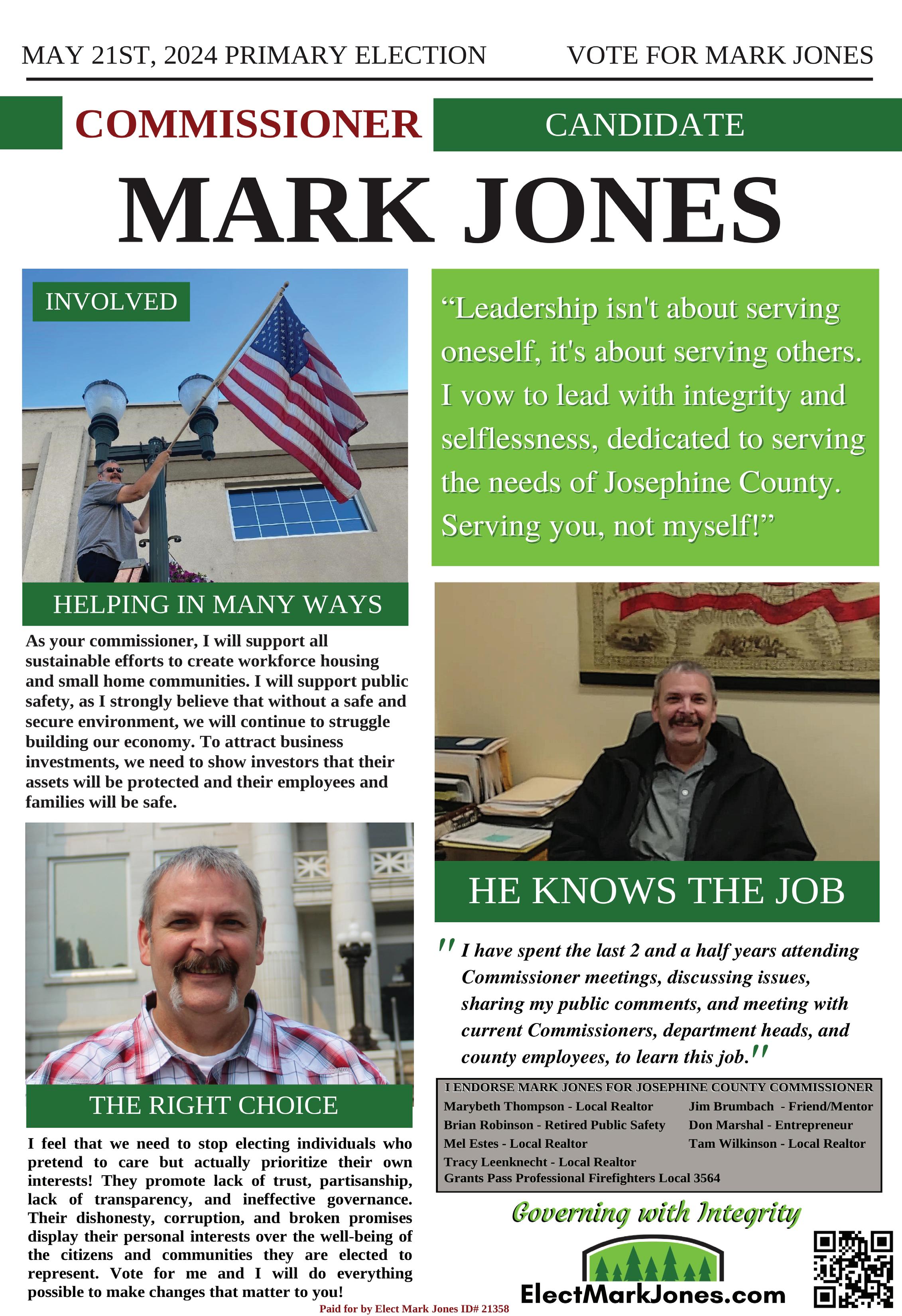

SUNDAY, APRIL 28, 2024
Accusations spark transparency debate
Investigation reveals alleged collusion among josephine county commissioners
By: John OliverJOSEPHINE COUNTY, OR — A recent investigation by the Grants Pass Tribune has uncovered allegations suggesting a longstanding collusion between two prominent Josephine County commissioners, John West and former commissioner Simon Hare. Allegations of secret meetings and hidden dealings between incumbent County Commissioner John West and former Commissioner Simon Hare have ignited a firestorm of controversy. The accusations, brought to light by the Grants Pass Tribune, suggest a pattern of clandestine activities that violate public trust and potentially breach legal obligations.
Behind Closed Doors: A History of Secrecy
The relationship between West and Hare appears to extend beyond the confines of public governance, with our investigations uncovering years of undisclosed interactions. What remains troubling is the apparent absence of any recorded meetings or public knowledge of these exchanges — fundamental aspects of democratic governance that both commissioners have sworn to uphold. Simon Hare's

controversial past, marked by a legacy of questionable decisions and allegations, casts a shadow over these recent developments, amplifying concerns about ethical conduct within the county's leadership. The investigation suggests that these meetings were not merely informal exchanges but may have involved decisions affecting public policy, resource allocation, and economic development without proper authorization or public input.
According to sources close to the investigation, John West and Simon Hare have been holding undisclosed meetings for years, bypassing public scrutiny and official records. This clandestine behavior appears to contradict John West's oath as an elected official, violating the fundamental principles of accountability and transparency that underpin public office.
Scrutiny and Community Disconnect
For residents of Josephine County, these accusations resonate with a broader sentiment of frustration and disillusionment. Both West and Hare have faced scrutiny in the past for decisions perceived as disconnected from community needs and input. The lack of transparent decision-making, coupled with allegations of unauthorized actions such as questionable hiring practices and recent financial transactions without proper documentation, further erodes public confidence.
Project Delays and Allegations of Favors
The contentious Pipe Fork Project and the delayed AMR Mining project are focal points of discontent among county residents. Accusations of deliberate delays, deception, and potential conflicts of interest have fueled speculation that these projects may be intertwined with personal interests and past favors exchanged between the commissioners. The implication of enriching themselves through private dealings behind closed doors amplifies the gravity of the accusations.
Attempt to Conceal Information
Our investigation took a dramatic turn when we submitted a formal request under the Freedom of Information Act (FOIA) seeking access to records related to searches
• see ACCUSITIONS, page 5
Possible changes to public sleeping ordinance
City of Grants Pass awaits Supreme Court
decision
By: Curt BlakeneyGRANTS PASS, OR — The Supreme Court heard a pivotal case challenging a local ordinance in Grants Pass, Oregon, which prohibits the use of blankets or pillows by those sleeping on public land. This hearing represents a significant legal and societal issue amidst rising homelessness rates nationally and the growing number of encampments in urban areas.
The city of Grants Pass, with a population of nearly 40,000, has become a focal point in the national conversation on how cities can manage public spaces while respecting the rights of the homeless. The case, following an increase in homelessness and public encampments, tests the boundaries of municipal powers against the constitutional rights outlined in the Eighth Amendment.
Background of the Case:
This Supreme Court case revisits issues similar to those raised in a previous case from Boise, Idaho, which the Court declined to hear in 2019. Since then, homelessness has only intensified, with a federal count identifying over 250,000 people living in makeshift accommodations such as parks, streets, and vehicles. The city’s ordinance was designed to ensure that public lands remain open and safe for all citizens but was challenged as being unconstitutional for penalizing the status of being homeless when no adequate shelter alternatives are available.
Legal Arguments and Perspectives:
During the oral arguments, the justices appeared divided. The Court’s liberal justices questioned the fairness of targeting homeless individuals for performing the unavoidable act of sleeping in the absence of shelter options. Justice Sonia Sotomayor and Justice Elena Kagan highlighted the essential, involuntary nature of sleep, likening it to other

basic human necessities that should not be criminalized. Conversely, the Court’s conservative justices emphasized the complexities of policymaking regarding homelessness and questioned the appropriateness of judicial intervention in such intricate policy arenas. They raised concerns about where to draw the line between an individual’s conduct and their status.
Implications for Grants Pass and Beyond:
The City of Grants Pass argues that the Ninth Circuit’s previous rulings have severely limited the city’s ability to regulate the use of its public spaces, inadvertently encouraging the proliferation of encampments. The city lacks sufficient public shelter capacity, with a shortage of 4,000 housing units, reflecting a national crisis of affordable housing scarcity. This legal battle comes at a time when cities and states across the country are adopting various strategies to manage homelessness. Some jurisdictions have implemented
sweeping camping bans, while others, like Florida, have introduced measures to relocate homeless populations into government-run facilities.
Concerns and Future Outlook:
A decision favoring the city could lead to more aggressive strategies nationwide for handling public encampments, potentially triggering a wave of exclusionary practices against homeless populations. However, such measures do not address the underlying issues of housing affordability and availability that drive homelessness. Grants Pass officials stress that regardless of the Supreme Court’s decision, the city will continue to face significant challenges in addressing homelessness, given the critical lack of adequate shelter and affordable housing. The outcome of this case is unlikely to resolve the broader systemic issues but will set a significant precedent affecting the treatment of homeless individuals across the United States.













Supreme Court ruling ends nationwide "assault weapon" and magazine bans
GPT News Desk
The United States Supreme Court has ruled to end all nationwide bans on so-called "assault weapons" and high-capacity magazines. This landmark ruling comes after a series of legal challenges mounted against state-level prohibitions on these firearms.
The Supreme Court's involvement was spurred by multiple cases appealing state bans on certain firearms, which have now escalated to seek immediate review at the highest judicial level. These cases have drawn national attention due to their potential to reshape gun laws across the country.
The recent development gained widespread traction after a YouTube video circulated, highlighting a critical mistake made by the state of Illinois in response to the lawsuits. This misstep appears to have propelled the legal battles forward, leading to a swift escalation to the Supreme Court.
The term "assault weapon" is broadly used to describe semi-automatic firearms with certain features, such as detachable magazines, pistol grips, and folding or telescoping stocks. Proponents of these bans argue that such firearms pose an increased risk to public safety due to their perceived ability to cause mass casualties in shooting incidents.
However, opponents of these bans assert that the term "assault weapon" is vague and misleading, encompassing firearms that are commonly used for lawful purposes such as hunting and self-defense. They argue that restricting access to these firearms infringes upon Second Amendment rights guaranteed by the U.S. Constitution.
The implications of the Supreme Court's ruling extend far beyond the states directly involved in the legal challenges. By striking down these bans, the Court has set a precedent that could impact firearm regulations nationwide.

Advocacy groups on both sides of the debate are closely monitoring the situation, with gun rights activists celebrating the decision as a victory for Second Amendment freedoms. Meanwhile, proponents of stricter gun control measures express concern over the potential repercussions on public safety.
The Supreme Court's intervention marks a significant shift in the ongoing national dialogue surrounding gun control and the interpretation of Second Amendment rights. The
decision underscores the Court's role in interpreting constitutional principles and shaping the legal landscape on issues of profound societal impact.
As the legal proceedings progress, the nation awaits further developments in what promises to be a defining moment for gun policy in the United States. The outcome of these cases will undoubtedly influence future legislative and judicial actions related to firearm regulations at both the state and federal levels.




May 12 1:00 – 4:00PM
Drawings Every Hour
W Fe Slot Play or a Party Ni g ht Packa g e
value d at over $400!
Party Ni g ht Packa g e clud es a one-ni g ht Hotel st ay, a pa of Concert Tick s, Dg vouer and Fe Slot Play!



Community engagement in Josephine County
Chris Barnett's campaign highlights
By: Leaf BarretAmidst the spirited campaign season in Josephine County, Chris Barnett has been actively engaging with residents, addressing critical concerns, and outlining priorities for the county's future. Recently, Barnett was spotted at various community events, showcasing a commitment to public service and a passion for addressing key issues affecting local residents.
One notable visit was to the Williams Grange, where Barnett engaged with residents, listening to their concerns and advocating for fair representation for Williams within the county. He emphasized the importance of every city having a voice in decision-making processes, promising to be a strong advocate if elected as county commissioner.
In addition to community gatherings, Barnett took to the airwaves, participating in discussions on KAJO FM 99.7 and KAJO AM 1270. Alongside other commissioner candidates, Barnett utilized the platform to articulate his motivations for running and highlight key focus areas, including addressing homelessness,
supporting law enforcement, enhancing county departments' effectiveness, promoting community unity, and advocating for citizen representation.
Barnett's involvement extended beyond talks and meetings. He actively participated in local initiatives, such as joining Park Watch, a volunteer group dedicated to park cleanup efforts. During this event, Barnett highlighted the interconnectedness between homelessness and substance abuse issues, expressing a firm commitment to tackling these challenges.
The campaign trail also led Barnett to the Josephine County Republicans Patriot Conference, a significant gathering for state and local candidates invested in improving Josephine County. Speaking alongside like-minded individuals, Barnett underscored his dedication to public service and his vision for a better county.
As the campaign gains momentum, Barnett encourages residents to review the voters' pamphlet for comprehensive candidate information. With ballots scheduled for mailing on May 1st, Barnett urges active participation in the electoral process, emphasizing the importance of community collaboration to drive positive change in Josephine County.
GRANTS PASS WEATHER
conducted on elected officials' email accounts within Josephine County. However, the response received from the county raised suspicions, claiming uncertainty about the existence of requested information — a statement that could potentially violate legal statutes governing public records. Moreover, the Board of Commissioners hastily convened a meeting shortly after receiving the FOIA request, prompting concerns that this was an attempt to obstruct transparency and provide cover for potential wrongdoing. The urgency and nature of their response raise red flags, suggesting a deliberate effort to delay, delete, or hide incriminating evidence — an action reminiscent of high-profile cases involving federal officials.
Legal Precedent and Consequences
The Grants Pass Tribune's reference to previous legal cases involving Oregon cities that failed to comply with public records requests underscores the seriousness of the situation. The outcomes of these cases highlight the legal responsibilities incumbent upon public agencies, including the retention and accessibility of official communications.
Failure to adhere to these obligations, as demonstrated by historical legal precedents, carries significant legal and reputational consequences. Notable court cases, such as City of Lebanon v. POET and Gannon v. City of Gold Beach, serve as cautionary tales, highlighting the repercussions of failing to adhere to legal obligations regarding public records. These cases underscore the importance of transparency and accountability in government operations, principles that seem to be at risk in Josephine County.
The Fight for Transparency
The Grants Pass Tribune's recent actions, filing a formal request under the Freedom of Information Act (FOIA) to access records related to searches on elected officials' email accounts, reflect a crucial step towards accountability. However, the response from county authorities has been less than reassuring. The acknowledgment of the request was clouded by uncertainty regarding the availability of requested information — a stance that, if true, would contravene multiple statutory obligations regarding public records.






The Path Forward: Accountability and Reform
As the clock ticks on the Grants Pass Tribune's ultimatum for compliance, the community awaits the county's response. The threat of involving federal agencies like the FBI underscores the gravity of the situation and the stakes involved. Beyond the immediate demands for transparency, this controversy serves as a rallying cry for broader reforms to ensure accountability and restore public trust in Josephine County's governance. The unfolding saga of John West and Simon Hare shines a spotlight on the vital importance of transparency and integrity in local government. The accusations, if proven true, would not only mark a breach of public trust but also a failure to uphold the fundamental principles of democratic governance. As Josephine County continues to deal with these revelations, the pursuit of accountability and reform must remain paramount to safeguard the interests of the community and preserve the integrity of local governance for future generations of Josephine County.

Planner

Rising gas prices pose challenges for seniors on fixed incomes
BY: NEL KWIATAS GAS PRICES CONTINUE TO SURGE across the country, senior citizens living on fixed incomes are feeling the pinch once again. The steady climb in fuel costs has become a significant concern, affecting budgets and daily expenses for many older adults. With no immediate relief in sight, seniors are seeking strategies to navigate this challenging situation.
Impact on Fixed Incomes
For seniors relying on fixed incomes from pensions, Social Security, or retirement savings, the recent increase in gas prices has created a financial strain. Many older adults budget meticulously to cover essential expenses such as housing, groceries, and healthcare. The sudden rise in fuel costs means allocating more funds toward transportation, leaving less for other necessities.
Budget Adjustments
To cope with higher gas prices, seniors are making adjustments to their budgets. Some are reducing discretionary spending, such as dining out or entertainment, to offset the increased cost of fuel. Others are exploring alternative transportation methods, like carpooling or using public transit when feasible, to minimize fuel expenses.
Impact on Daily Activities
Rising gas prices are also impacting seniors' ability to engage in daily activities. For those living in rural areas or without reliable public transportation, driving is often essential for accessing medical appointments, grocery stores, and community services. The higher cost of fuel may limit seniors' mobility and independence, requiring careful planning and prioritization of outings.
Seeking Assistance
In response to the ongoing challenge of high gas prices, seniors are encouraged to explore available resources and assistance programs. Local senior centers, community organizations, and government agencies may offer support with transportation, financial counseling, or energy assistance programs designed to help offset rising costs.
Long-Term Strategies
As gas prices remain unpredictable, seniors are advised to consider long-term strategies to manage their budgets effectively. This may include exploring more fuel-efficient
vehicle options, maintaining regular vehicle maintenance to optimize fuel efficiency, and staying informed about local gas price trends to plan trips strategically.
Community Support
Communities can play a crucial role in supporting seniors during this period of economic uncertainty. Neighborly initiatives such as carpooling groups, volunteer driving services, and community outreach programs can help alleviate the burden of high gas prices for older adults.
Advocacy Efforts
Seniors and their advocates are urging policymakers to address the root causes of rising gas prices and implement measures to stabilize fuel costs. Calls for increased investment in public transportation, renewable energy alternatives, and consumer protections are gaining momentum as seniors voice their concerns about affordability and accessibility.
Staying Informed
To stay informed about developments related to gas prices and available resources, seniors are encouraged to leverage trusted sources of information. Local news outlets, senior advocacy organizations, and government websites can provide updates on fuel prices, energy assistance programs, and community support services.
Community Resilience
Despite the challenges posed by rising gas prices, seniors demonstrate resilience and resourcefulness in adapting to changing economic conditions. By staying informed, seeking support from their communities, and exploring practical strategies to manage expenses, older adults on fixed incomes can navigate this period of uncertainty with determination and resilience.
The persistence of high gas prices presents significant challenges for seniors on fixed incomes, impacting budgets, daily activities, and overall quality of life. As communities come together to support older adults during this challenging time, seniors are encouraged to explore available resources, adopt budget-conscious strategies, and advocate for policies that promote affordability and sustainability in transportation. Through collective efforts and resilience, seniors can overcome the financial hurdles posed by rising gas prices and continue to thrive in their communities.


























MEMORIAL DAY WEEKEND
MAY 23, 2024 - MAY 27, 2024
Riverside Park, Grants Pass



Thousands of locals and visitors from around the world come to share the tradition and unique experience of Boatnik.
Visit
